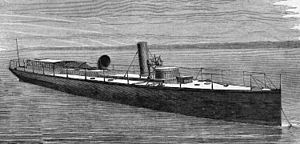HMS Lightning (1876) facts for kids

HMS Lightning - illustration from Scientific American.
|
|
Quick facts for kids History |
|
|---|---|
| Builder | John I. Thornycroft & Company |
| Launched | 1876 |
| Renamed | Torpedo Boat No. 1 |
| Fate | Scrapped, 1896 |
| General characteristics | |
| Class and type | Torpedo boat |
| Displacement | 32.5 long tons (33.0 t) |
| Length | 87 ft 6 in (26.67 m) |
| Beam | 10 ft 9 in (3.28 m) |
| Draught | 5 ft 2 in (1.57 m) |
| Propulsion | Two-cylinder compound steam engine, 460 hp (340 kW) |
| Speed | 18.5 kn (34.3 km/h) |
| Armament |
|
HMS Lightning was a special kind of ship called a torpedo boat. It was built for the Royal Navy in 1876. This ship was very important because it was the first seagoing vessel to use self-propelled Whitehead torpedoes. These torpedoes could travel underwater on their own to hit enemy ships. Later, HMS Lightning was given a new name: Torpedo Boat No. 1.
Contents
Discovering HMS Lightning
HMS Lightning was built by a company called John I. Thornycroft & Company. They built the ship at Church Wharf in Chiswick, England. When it launched in 1876, it changed how navies fought at sea.
A New Way to Fight
Before HMS Lightning, torpedoes were often dropped from ships or launched from fixed tubes. But the Whitehead torpedo was different. It could steer itself underwater. This made HMS Lightning a very advanced warship for its time. It showed how small, fast ships could carry powerful weapons.
How Torpedoes Were Launched
When HMS Lightning was first built, it had two "drop collars." These were special frames that would lower the torpedoes into the water. Then, the torpedoes would start their journey. In 1879, the ship was updated. The drop collars were replaced with a single torpedo tube located at the front (bow) of the ship. This tube made it easier to launch the torpedoes. The ship also carried two extra torpedoes in the middle, ready to be reloaded.
Life as a Training Ship
HMS Lightning spent its entire working life helping out at a special school. This school was called HMS Vernon, located in Portsmouth. HMS Vernon was a torpedo school, where sailors learned all about torpedoes. Lightning acted as a "tender" ship. This means it supported the main school and was used for many experiments. Sailors would practice with the torpedoes on Lightning. It helped the Royal Navy learn more about these new weapons.
The End of Its Journey
After many years of service and experiments, HMS Lightning was no longer needed. It was "broken up" in 1896. This means the ship was taken apart, and its materials were recycled. Even though it was taken apart, HMS Lightning left an important mark on naval history. It helped shape the future of torpedo warfare.
 | Valerie Thomas |
 | Frederick McKinley Jones |
 | George Edward Alcorn Jr. |
 | Thomas Mensah |


